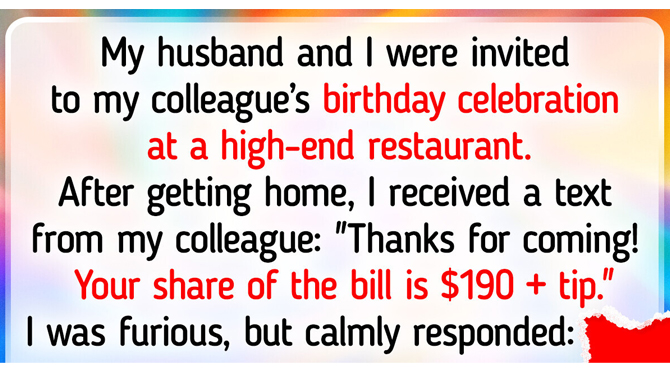The topic of splitting the bill at a dinner invitation is often a sensitive one. For Stella, the situation became unexpectedly awkward when she attended her colleague’s birthday celebration. Having already brought a thoughtful gift, she was blindsided by a request to cover her portion of the bill. Believing it was unfair, Stella chose not to pay. However, what started as a simple disagreement quickly spiraled into workplace drama, turning a personal matter into a much bigger issue.
Stella’s letter:
My husband and I were invited to my colleague’s birthday celebration at a high-end restaurant. After getting home, I received a text from my colleague: “Thanks for coming! Your share of the bill is $190 + tip.”
I was furious, but calmly responded: “I think the nice gift I gave you already covered my part ;).” The real shock came the next day at work. As soon as I walked in, I noticed people staring.
Another colleague rushed up to me and said, “Can you believe it? One of the girls refused to pay her part of the dinner yesterday! What a cheapskate!”
I kept quiet and didn’t reveal it was me. Then, I was shocked when I found sitting on my desk, the gift that I had brought her. She had returned it!
I still believe what she did was against etiquette. You can’t expect people to bring a gift and pay for an expensive dinner when you’re the one inviting them.
Am I wrong?
– Stella
Hello Stella! Thank you for opening up and sharing your story. We’ve compiled some advice to support you as you work through this challenge.
Politely confront the colleague.
Approach your colleague privately and address the issue calmly. Say something like:
“I noticed that you returned the gift I brought for your birthday. I wanted to clarify if it was because I didn’t pay for the dinner. I had assumed the gift was a gesture of appreciation for the invitation and wasn’t aware we were expected to contribute to the dinner bill.”
This approach gives her an opportunity to explain herself while showing that you value clarity and communication.
Discuss the situation with your manager or HR.
Since the incident has affected your workplace atmosphere (e.g., gossip and stares from colleagues), consider bringing it up with your manager or HR. You don’t need to lodge a formal complaint but can frame it as a misunderstanding affecting your professional relationships:
“I’m concerned about an issue stemming from a personal event involving a colleague that has led to some tension at work. I’d like advice on how to address it constructively.”
This ensures the issue doesn’t escalate further or damage your reputation.
Set clear boundaries moving forward.
Use this experience as a learning moment to avoid similar situations in the future. For example, if you’re invited to another event with unclear expectations, ask for details upfront:
“Thank you for inviting us! Can you clarify if this is a hosted dinner or if guests are contributing? I want to make sure I plan accordingly.”
This preemptive approach prevents miscommunication and ensures you’re not blindsided again.
Share your perspective with trusted colleagues.
Since gossip is circulating, share your side of the story with one or two trusted colleagues to provide context and prevent further misunderstandings. For example, you might say:
“I heard there’s some talk about someone not paying for the dinner. I wanted to share that I brought a thoughtful gift for the occasion, not realizing payment for the meal would be expected. I now see it was a misunderstanding, but I hope everyone understands my perspective.”
This can help mitigate any damage to your reputation while keeping the focus on your actions being reasonable.
